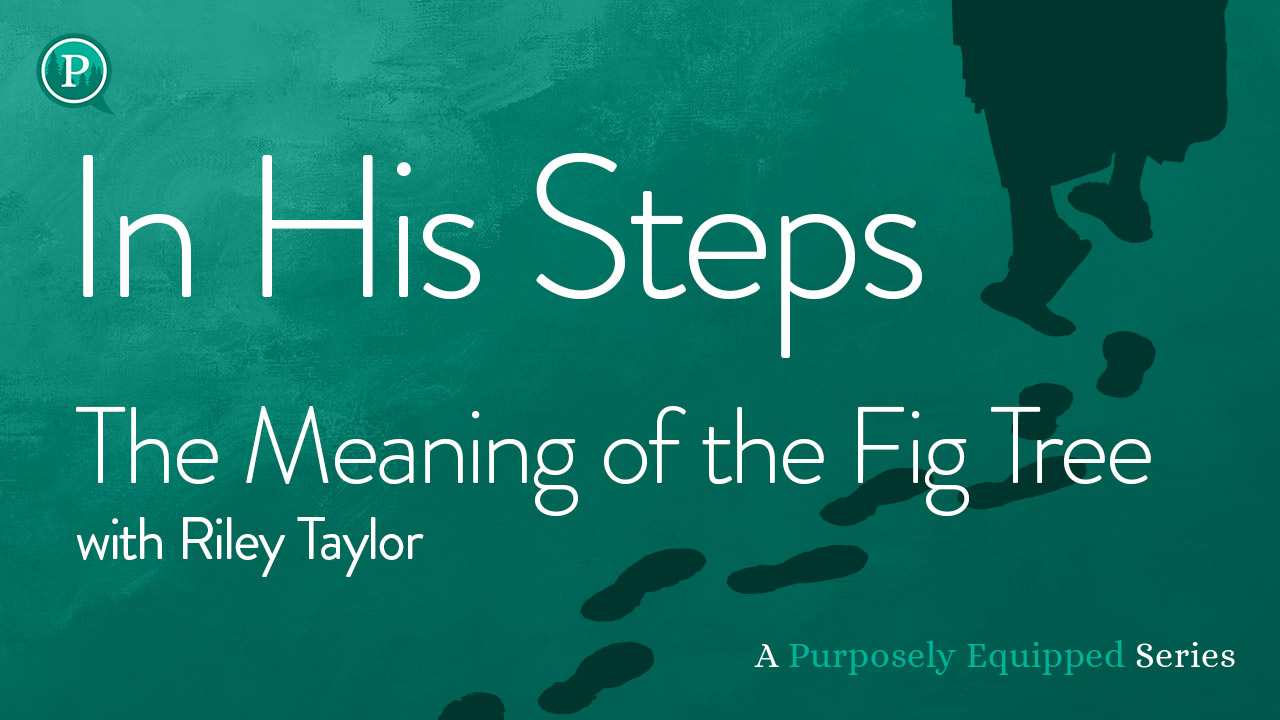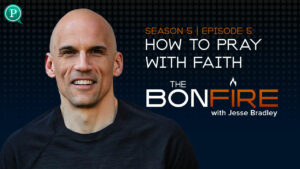We found out yesterday that Jesus curses a fig tree. Why did he do this? What does this illustration show us? What deeper spiritual problem does he point to in the story he tells? Journey with Mark and Riley Taylor from Calvary Fellowship Church as we follow Jesus on day 3 of this Holy Week journey and how we can apply these truths in our lives.
Show Notes:
Transcription:
Purposely your life, God’s purpose. Listen at onpurposely.com. In His Steps, a Holy Week journey.
Mark Holland:
Once again, another pastor in studio as we walk in his steps this holy week looking at different days of the Holy Week and different events that happened. We’re into today, number three, and we have, I guess it’d be pastor number. Pastor number three. Yeah. But he’s number one today. He is. He’s Riley Taylor of Calvary Fellowship in Mount Lake Terrace. Hi there, Riley.
Riley Taylor:
How are you, Mark?
Mark Holland:
Good. Good
Riley Taylor:
To, so g good to be here.
Mark Holland:
Good to get to know you talking a little bit before we started recording today, and you and I have a lot of great similar interests. I think about, obviously love for the church, love for God’s word, love for Israel, and some of that is addressed and what happens on this day of day three. We will talk about that here in just a moment. Tell us a little bit about Calvary Fellowship. Now, I remember I telling you I used to go to Calvary Fellowship back way back.
Riley Taylor:
Yeah. Where have you been?
Mark Holland:
at Lincoln. Lincoln High School. In the U District with Wayne Taylor.
Riley Taylor:
Yep. Wayne’s my dad and I. ,
Mark Holland:
OH, Wayne’s your dad? Okay.
Riley Taylor:
He is. And if I could be half the man that he is, then I’d be a happy man. He has an incredible legacy. God has done amazing things through him and just the, we’ve started 40 churches around the world, so it’s quite a legacy. And I’ll be honest, walking into that as the lead pastor taking over, coming up on five years, big shoes years ago, man, big shoes to fill, roughly size 11, and I’m only size 10. But yeah, it’s going awesome. I wouldn’t have chosen to take over a church a year before, COVID but it’s been challenging, but also winnowing or purifying, you could say. And so enriching and just watching the Lord use the church, see people coming to know him, grow in their faith. Any lead pastor’s going to tell you that that’s what it’s all about, no matter who you are or where you are.
Mark Holland:
Well, that’s what we hope to accomplish through these podcasts of having different pastors share their thoughts about this. Well, it’s called the Holy Week or the Passion of Christ these days leading up to obviously the crucifixion and resurrection, but we’re back a few days before that where Jesus is more or less coming in as a kind of a triumph. We had Palm Sunday, we just came through and everyone was thinking he was the Messiah, and he comes to this event with a fig tree. And so we’ve asked you to kind of expound on what day three in this story means.
Riley Taylor:
Yeah, so that would be what, Tuesday? Tuesday? What do they call that? Tuesday? What’s the name of Tuesday?
Mark Holland:
I don’t know.
Riley Taylor:
Maundy Tuesday or Mon, what is that, Maundy Thursday,
Mark Holland:
Maundy Thursday.
Riley Taylor:
Yeah, that’s right. That’s right. I don’t know all the traditional names for it, but it was definitely like you could say it’s an eventful week and literally two days before this, he’s just come into the city riding on a donkey’s colt. I was just reading the story this morning, and I never noticed that when he tells his disciples, go get the colt, and if they ask you what you’re doing, say the master has need of it, and he’ll bring it right back. Yeah, right. Did you notice that?
Mark Holland:
Yeah, I did notice that.
Riley Taylor:
I just thought, I love how Jesus is so conscientious and he’s like going to return his Hollywood video rental on time. Right? Rewound. But anyway, so we come to Tuesday and there’s this interesting story where the disciples are, where they’re in Bethany or coming from Bethany, and here’s what we read. This is Mark 11, starting in verse 12. On the following day when they came from Bethany, he was hungry and seeing in the distance of fig tree in leaf, he went to see if he could find anything on it. When he came to it, he found nothing but leaves for it was not the season for figs. And he said to it, may no one ever eat fruit from you again. And his disciples heard it, but it’s really the next day that we’re talking about today, right? Tuesday.
Mark Holland:
Yeah, so why was he expecting figs on a tree? Even they even acknowledge it wasn’t even the season for figs to be ripe.
Riley Taylor:
That is the great mystery. And I was pondering it. And I think the reason is this, the author is pointing to something important here. He’s saying it was not the season for figs, which means it was April, it was Passover week. This really happened. The season for figs would’ve been somewhere around June to November. So it’s just a reminder that this happened around Passover week, probably five days before or a few days before. So this is a real story. And the point of the story is not, wow, Jesus was hungry and he couldn’t find any breakfast. That’s not the point of it. That’s not what made him do it. He curses the fig tree, be for a reason, and it’s a bigger reason than I’m still hungry. Where’s my food? Now, that was actually the problem Bertrand Russell had about this story. Really? He was a, yeah. Oh yeah.
Mark Holland:
Famous atheist, philosopher famous philosopher.
Riley Taylor:
Yes. And he actually in his book, talks about the Figtree story, and he goes, what’s Jesus’ problem here? He’s blaming fruitlessness on this tree, but it’s not even the time for figs. So what’s his problem? And then in the next line, he says, so therefore, I think Socrates was a better man than Jesus. Oh, I go, wow, some real deep Bible study there. But the point that I see is that Jesus curses the fig tree, not because it doesn’t bear figs, but because it’s an illustration. He’s telling a story. He’s pointing to something deeper, a spiritual problem in the nation. The fig tree in Jeremiah eight and in other places represents Israel, represents Israel God’s people. And think of the other parables that tell a similar story, the vineyard that was managed by poor managers. And so they’re not managing it well. They’re kind of killing or expelling different people who check in on behalf of the master.
And Jesus says, therefore, my vineyard will be given to others. It’s a similar idea that God’s people had lost the plot, they missed it. They were, what does he say? The kingdom of God will be given to others who are bearing fruit. That’s the same thing with the fig tree. The fig tree is a picture of Israel. They had lost the plot. They were not bearing fruit. So therefore, Jesus says, you’re not going to bear fruit ever again. And he curses it. And it’s not till the next day that, which is I guess Tuesday that Peter sees it. And you read this in verse 27, Mark 11:20, sorry, Mark 11:20. As they passed by in the morning, they saw the fig tree withered away to its roots. So it’s completely.
Mark Holland:
Really dead,
Riley Taylor:
Really dead. And Peter remembered and said to him, rabbi, look, the fig tree that you cursed has withered. And Jesus answered him. So it’s the next day that we get the point of what happened. And so I think that’s what’s really important, is it? It’s not till the next day. Well, what has happened since in between the author, Luke is doing what he often does, which is bracketing something. He brings up something, then goes somewhere else, and then brings it home right after that. This is very popular in many stories and movies and TV shows. It’s, we call it foreshadowing, if you’re familiar with the storytelling principle, Chekhov’s , gun. Have you ever heard this? Okay, Chekhov’s gun is a storytelling principle. Meaning if you see a gun in Act one, it better be fired in Act three. Okay? So the point is that it’s called foreshadowing. You have a closeup shot on this thing. It’s meaningful. The audience goes, huh, what’s that mean? And then by the end of the story, this
Mark Holland:
Like Ro Rosebud or whatever, citizen king. Yes, that’s right. Or that little rose bud. Yeah. You find out at the end it’s a sled or whatever.
Riley Taylor:
It’s a sled. Yeah, his sled, exactly right. It peaks the curiosity. So Mark is like, what is this fig tree? What’s it about? Well, right after that, Jesus goes into the temple and he sees that in the court of the Gentiles, they’re exploiting people. They’re exploiting the poor, they’re selling their wares. He says, that you’ve turned a house of prayer into a den of robbers. Now, what’s key is in verse 17, he says, is it not written? My house shall be called a house of prayer for all the nations. Israel had lost the plot. Why had they withered and died? Why were they no longer bearing fruit? It’s because they forgot their role in God’s plan. The promise to Abraham was that your family will be a blessing to the nations that you guys were supposed to be a light to the Gentiles, a global light of how amazing God is.
But they had lost that. And the thing going on in the temple was just an example. It was just another example of that. So Jesus flips over tables and kind of purges the temple court there, and it’s after that we learn what the fig tree was all about. So to me, there’s like some brilliant storytelling going on. What was happening? What does it mean? Jesus is pointing to something, God’s people represented by this tree had stopped bearing fruit. And so he curses it and he says, this is an example. This is where you’re at. You’ve withered down to the roots. And he says, elsewhere, I’m going to give it to someone else, someone who’s going to bear fruit. Well,
Mark Holland:
And then we know prophetically, which is a bigger subject, that the time of the Gentiles was coming in. Now I’ve got other people that I need to gather in all those kinds of quotes from Jesus that he was preparing the way for the gospel to go worldwide.
Riley Taylor:
Well, in fact, Paul uses this same imagery. When he makes that point, he says, you that Gentiles will be grafted into the vine, a foreign branch brought in to the vine. It’s a similar image. It’s like people were always thought to be this vine or this tree or this vineyard. And the Gentiles are kind of pictured by Paul to be brought into that story, even though they weren’t naturally born into that story. But that’s the age that we’re in now. Yeah.
Mark Holland:
And there’s prophetic ideas about the restoration of modern Israel maybe has some connection to this, but again, that’s for a different kind of study. Well, okay, so he was basically saying, your time’s up Israel, like you say, they had lost the plot. Israel’s history was coming to a close in a sense, for as far as spiritual truth, because he was fulfilling those ideas of the Old Testament with his own life and death. How does this relate then to us today? What are we supposed to take from this kind of story? Because this is again, the money changers. This is one of the main times where Jesus really almost, I can kind of lost it, or he seemed quite violent, quite angry, and it really surprised everybody because he’d been just kind of healing everybody. No questions asked and let everybody come to me. And sinners could all come to him, but he really got angry during this period.
Riley Taylor:
And that was the point. Bertrand Russell was making. A lot of people point to this and go, wow, that’s very unkind thing to do to a tree. And I go, well, every step you take, you’re stepping on bacteria and stuff like death is of plants or organisms is sort of pretty normal. But Jesus is not doing this for no reason. I don’t think this is an flash of his anger. He’s like, oh, I’m hungry. That’s not what’s happening. The hunger that he has where he’s hungry, it’s what brings to mind this idea. And he goes, and he looks to see if there’s figs on it. It’s what gives rise to the story. But it’s not the point of the story. The point of the story is what was going on with Israel. And Peter is curious about that. So when Peter asks a question, what does this mean?
Right? Verse 21, right? Hey, look what is going on here? That anytime I look at it in the scripture, anytime I see a character ask a question or go, oh, what does this mean? In Acts, everyone’s speaking in tongues on Pentecost. And some of them ask, what does this mean? That’s author’s trying to point you to right here. The answer’s going to come right after this verse. What does this mean? Jesus? Look, the fig tree is withered. So it’s right after that that Jesus says in verse 22, have faith in God. And then a couple verses later, he says, pray. Pray with belief and with faith. And then right after that he says, and while you stand praying, forgive. So faith, prayer, and forgiveness. And that’s curious. That’s interesting that that would be the point of this story. Why does his mind go there? Why is that the answer to Peter’s question?
And I think that that’s how you don’t lose the plot. This is how you stop withering dying. This is how you’re going to bear fruit in your life. One, have faith. Now, what is faith? Faith is trust. It’s allegiance to Jesus as king. It’s belief that God is great and bigger and powerful, as he says in the next line, he says, faith, true belief can move mountains. You know, say to this mountain, be cast into the sea. Or how does he put it here? Yeah. Be taken up and thrown into the sea and not doubt in your heart. So have that kind of faith. If you have that kind of faith, you won’t wither and die like that fig tree. Prayer. Now he says prayer. Prayer with belief. Well, prayer is just kind of the outward demonstration of faith, right? Someone who prays is someone of faith.
So faith gives birth to prayer and ongoing communion, talking, hearing, speaking, listening, spending time with God, as he says in John 15, abide in me. That’s prayer. So faith gives birth to prayer, which then gives birth to a transformed life. And that transformation is seen most clearly in forgiveness because Jesus says in another place, Matthew six and elsewhere, if you don’t forgive, then you don’t have the forgiveness of God. It’s like evidence that you know the Lord. So what is he saying? He’s saying, Peter, don’t be like this tree. Have faith. Be a man of prayer and forgive. And that is the rich soil that gives birth to much fruit.
Mark Holland:
And you’ve been listening to the Purposely Equipped series called In His Steps, a Holy Week Journey. And today you’ve been listening to Pastor Riley Taylor of Calvary Fellowship in Mount Lake Terrace. For more details about the church, visit them [email protected]. Please leave us a review of this message so more people can discover this podcast and find more episodes of Purposely Equipped at onpurposely.com.







